North Dakota’s Public Officials Should Be Required to Record Meetings Even When They’re Closed to the Public

Most of you reading this probably don’t live in Fargo, so you might not much care that the local park board there violated open meetings law, but if you’re a resident of North Dakota you should be paying attention because how this situation is being handled could very well be how some government entity in your backyard is operating.
The Attorney General found last week that the park board violated the law in closing a meeting at which they discussed the departure and severance package for former executive director Joel Vettel. The ruling was in response to a complaint filed by Fargo Forum news editor Archie Ingersoll.
The AG’s opinion required the park board to “review the meeting minutes” from the meeting that was illegally closed to the public “and add in further details of what was specifically discussed.”
The park board has done that now, as the Forum’s Barry Amundson reports, but see if you can spot the problem:
On Tuesday, the five-member board approved minutes with more detail of the July 2 meeting, where they also appointed deputy executive director Dave Leker as interim executive director.
[…]
The July 2 meeting minutes were changed to reflect that “some commissioners noted that Mr. Vettel gave his best efforts to perform the duties of the executive director and that it was unfortunate that he was not a good fit for the position.”
[…]
Also in the amended minutes, it was added that Dawson asked whether it was “appropriate to provide a separation package that went outside of the scope of Mr. Vettel’s employment agreement” from the beginning of the year.
The commissioners determined that the “closest applicable term” to the circumstances of Vettel’s employment was that the board was “terminating (his) employment without cause which called for him to receive a salary for a period of six months,” according to the new minutes.
Essentially the park board added more detail into their minutes, and that’s great as far as it goes, but we’re still relying on these elected officials who have already been unwilling to be forthcoming about this matter to the public to provide us with an accurate and complete accounting of what they discussed at their illegally closed meeting.
“How do we really know this is the whole story?” a reader asked me, responding to Amundson’s story. “We are still trusting the same people to accurately reflect in their minutes what happened…there isn’t a real check and balance.”
That’s right. The reader suggested state law be changed to create a recording – audio, at least, but preferably video – of meetings which are closed to the public. That way, if a dispute arises about whether or not a given meeting was legally closed, there’s a complete record which can be reviewed by the Attorney General’s office and, if appropriate, released to the public.
We wouldn’t have to rely on politicians and bureaucrats to provide us with an honest accounting of what happened and what would discussed.
Outside of their general reticence to discuss the Vettel situation in public, a decision worthy of criticism I think, I don’t have any reason to believe the park board in this situation were anything less than honest in their new, expanded meeting minutes. But why should we have to take their word for it when recording a meeting could be as simple as setting up someone’s smartphone?
Local governments and their lobbyists would probably object to this recording requirement, and they’d probably talk about the cost of creating and maintaining the recordings, but let’s get real. It’s 2019. This stuff is cheap. They could be doing it. If they won’t do it voluntarily they should be made to.




